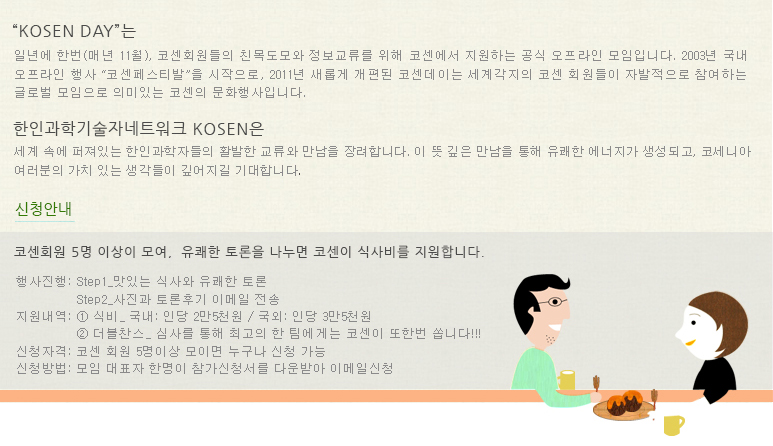지속가능한 발전을 위한 과학기술
미국_김수진
포함 10명 미국, 렉싱턴, Lexington, KY, USA (University of Kentucky, Jacobson Science Building)
- 256
이번 코센데이에 관해서 듣게 되고 기획하게 되면서, 한인공동의 과학자모임이 더욱 활성화되기를 기대하면서, 모임을 준비하게 되었습니다. 다양한 학문을 그것도 한국어로 소통하면서, 유학생활에서 겪게 되는 다양한 학문적 생활적 질문들을 서로 공유하면서 공동체의 소중함도 알게 되는 계기가 될거라 생각하였습니다. 더구나 우리대학은 한인 1세교수님들이 다양한 분야에 계시면서, 한인 과학자 모임에 적극 참여하면서, 한국 학생들과 교류하고 있는 터라 이번 코센데이는 앞으로 이모임을 더욱 활성화하는 계기가 되었습니다.
비록 넉넉하게 준비한시간이 아니라서, 지속가능한 주제에 대학 심도 깊은 이야기를 나눌기회는 아니었지만, 지속가능한 과학에 대해서 개괄적으로 고찰하면서 모임을 시작하였습니다.
아래 사항은 여러분야의 전공자들이 각각의 분야에 대해서 지속가능한 문제에 대해서 이야기 나눈것을 요약한 내용입니다.
김수진 : 개괄: 지속 가능 발전 포탈 인용
"‘지속가능발전’(Sustainable Development) 이라는 용어는 “세계환경개발위원회“(WCED)가 1987년에 발표한 우리 공동의 미래 (Our Common Future)에서 “미래 세대의 욕구를 충족시킬 수 있는 능력을 저해하지 않으면서 현재 세대의 욕구를 충족시키는 발전” (development that meets the needs of the present without compromising the ablility of generations to meet their own needs)이라고 정의하면서 본격적으로 사용하기 시작하였다.
지속가능발전은 한마디로 정의하기 어려운 담론으로 지속가능발전은 시대적 조류와 상황에 따라 활용 방법과 개념이 바뀌고 있다.
90년대 이전 경제, 사회, 환경을 서로 상호작용하는 별개의 영역으로 보고 경제성장과 환경보존을 대립관계로 보았으나, 이러한 틀을 깬 개념이 지속가능발전으로 경제성장, 사회통합 환경보전을 각각의 영역에서 동시 다발적으로 일어나는 시너지 현상으로 재 설정하였다.
이후 여러 회의와 논의를 거치며 인간사회는 환경에 내재되어 있고 경제는 사회활동의 일부에 불과하다는 시점에서 경제성장을 위해서는 사회적, 환경적 측변에서 지속가능한 근간이 마련되어야 한다는 의견이 거론되고 있다."
이민재 : 약학대학원생은 제약회사에서의 SDG관련 케이스 스터디를 소개했습니다.
"Vesela Veleva, Maureen Hart, Tim Greiner, Cathy Crumbley, (2003) "Indicators for measuring environmental sustainability: A case study of the pharmaceutical industry", Benchmarking: An International Journal, Vol. 10 Issue: 2, pp.107-119, "
Ten years after the Earth Summit, a frequently asked question is how much, if any, progress has actually been made toward sustainable development. This article provides insight into the progress made by business in addressing and measuring progress toward sustainable production. Using a fivelevel indicator hierarchy developed at the Lowell Center for Sustainable Production, the authors analyzed the environmental sustainability indicators voluntarilyreported by six pharmaceutical companies, half of which are Global Reporting Initiative pilots. Results demonstrate that most indicators currently being publicly reported address performance or ecoefficiency (Level 2), a few indicators look at environmental effects (Level 3), only the Global Reporting Initiative pilots are beginning to address and report on supplychain and product lifecycle effects (Level 4), and no companies are addressing carrying capacity issues (Level 5). Based on their experience with other companies, the authors feel that the results of this small, singleindustry survey reflect the current stateoftheart in terms of developing more sustainable production systems."
오지연 : 보건대학원 학생이 발표한 개요는 보건복지분야에서 정부, 학계, 그리고 사기업 분야에서 지속 가능 분야에 대한 연구 노력에 대한 세계적인 노력들을 발표하였습니다. "Takian, A., & Akbari-Sari, A. (2016). Sustainable Health Development Becoming Agenda for Public Health Academia. Iranian journal of public health, 45(11), 1502-1506."
Background: Sustainable Development Goals (SDGs) aim to transform our world, and each goal has specific targets to be achieved by 2030. For the goals to be achieved, everyone needs to do their part: governments, academia, the private sector and all people. This paper summarizes the main evidence-based recommendations made by excellent academics and scholars who discussed their experiences and views during the conference to respond to the challenges of sustainable health development. Methods: To contribute to exploring to the academia's role in reaching SDGs, the 1 st International Conference on Sustainable Health Development was held at Tehran University of Medical Sciences, on 24-25 April 2016, in Tehran, Iran. Results: In line with Goal 3 of SDGs: "ensure healthy lives and promote well-being for all at all ages", the conference discussed various aspects of Universal Health Coverage (UHC), as well as Global Action Plans for prevention and control of Non-Communicable Diseases (NCDs), and explained the special role of academic public health institutes in education, research and service provision in the two above-mentioned areas. Conclusion: To fulfill the requirements of SDGs, modern approaches to funding, education, teaching, research priority setting and advocacy, which in turn need novel strategies in collaboration and constructive partnerships among academic public health institutes from low, middle and high-income countries, are essential.
구진모 학생은 첫학기이기도 하고, 아직 곤충학 분야에서 중점화하고 있는 지속 가능 발전에 대한 고찰은 알수 없었다고 말했지만, 이 용어를 켄터키 한인 과학자 모임과 커뮤니티 활성화를 위해서, 앞으로 모임이 있을때마다 중요한 아젠다로 삼아 토론해볼 기회를 가져보고 싶다고 말햇습니다.
이정민교수는 교육학분야에는 많은 사례등이 발표되고 있다고 말했으며, 한두가지 사례를 들어 SDG in education에 관한 이해를 도와주었습니다. 참고문헌으로 UNESCO의 개괄을 설명했습니다. https://en.unesco.org/themes/education-sustainable-development-esd
With a world population of 7 billion people and limited natural resources, we, as individuals and societies need to learn to live together sustainably. We need to take action responsibly based on the understanding that what we do today can have implications on the lives of people and the planet in future. Education for Sustainable Development (ESD) empowers people to change the way they think and work towards a sustainable future.
UNESCO aims to improve access to quality education on sustainable development at all levels and in all social contexts, to transform society by reorienting education and help people develop knowledge, skills, values and behaviours needed for sustainable development. It is about including sustainable development issues, such as climate change and biodiversity into teaching and learning. Individuals are encouraged to be responsible actors who resolve challenges, respect cultural diversity and contribute to creating a more sustainable world.



